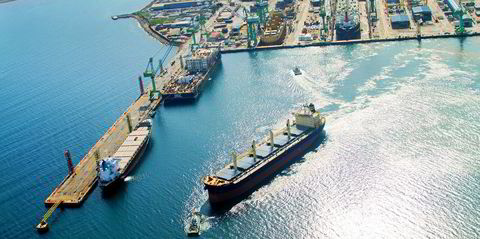Norway’s Klaveness Combination Carriers (KCC) has seen rates for its versatile ships hit record rates, but maintenance off-hire hurt the bottom line.
The Oslo-listed owner of vessels that carry both wet and dry cargoes called the first-quarter performance “solid”, with “historically high efficiency for the Cabu fleet and high tanker trading” for the Cleanbus.
Net earnings dropped to $26m from $28.2m a year ago, as revenue declined to $60.7m from $75.1m.
The dividend is $0.35 per share, or $21.2m.
KCC had ships off-hire for a total of 139 days, of which 130 were related to two dry-dockings that were delayed for a total of 23 days.
Chief executive Engebret Dahm said the performance demonstrated both the high efficiency and high flexibility of the business model.
“The Cabus delivered highly efficient operations with only 8% ballast and strong and stable earnings, while we utilised the flexibility of the Cleanbu fleet employing 75% of the … capacity in tanker trades to take benefit of the remarkably strong tanker market,” he added.
KCC owns 16 ships. The Cabus carry caustic soda and dry bulk, while the Cleanbus can handle oil products and dry cargo.
The owner logged all-time-high time charter equivalent earnings for the fleet at $40,514 per day, up from $36,823 in the fourth quarter.
This was driven by a strong product tanker market and supported by robust dry earnings, in addition to the high trading efficiency of the Cabu fleet, the company said.
Carbon intensity rises
Average TCE earnings for the Cabus were $34,824 per day, with Cleanbus at $46,593.
The carbon intensity of the fleet increased quarter on quarter, however.
The Cleanbus’ intensity rose 17%, more than offsetting the Cabus’ reduction of 4%.
This was because the Cleanbus were operating at higher speeds with increased ballast legs to capitalise on the strong tanker market.
KCC said it has strong Cabu contract coverage secured for 2024, and expects tanker markets to stay elevated.
Cabu TCE earnings so far in the second quarter are between $36,000 and $37,000 per day. The Cleanbus are between $37,500 and $40,500.
“Due to the large earnings difference between the dry bulk and the product tanker markets, the Cleanbu fleet is expected to maintain a higher share in tanker trading at around 70% over the next quarters,” the company said.





